小学英语形容词比较级总结大全
英语形容词的比较级和最高级整理

英语形容词的比较级和最高级整理常规:1、一般直接在词尾加er;est.tall---taller---the tallestgreat---greater---the greatest2、以字母e结尾的直接加r;stnice---nicer---the nicestfine---finer---the finest3、以辅音字母加y结尾的形容词变y为i再加er;estbusy---busier---the busiestheavy---heavier---the heaviest4、重读闭音节结尾的单音节词,若词尾只有一个辅音字母时,须双写这个辅音字母再加er;estbig-bigger-the biggesthot -hotter-the hottest5、少数以-y,-er,-ow,-ble结尾的双音节词,末尾加-er^D-est(以-y 结尾的词,如-y前是辅音字母,则变y为i,再加-er和-est;以-e 结尾的词仍只加-r和-st)happy—happier—happiestclever—cleverer—cleverest5、多音节和部分双音节词在词前加more、mosteasily--more easily--most easilybeautiful--more beautiful--the most beautiful特殊:(1 )有些单音节词的比较等级常用more和most,如glad,fond,shy,sly(但like 只可用more 和most)。
Eg:I am not more glad than you.我可没像你那样高兴。
Uncle Jack was more like a book of reference to my father.杰克大叔对我父亲来说真是一部参考书。
(2)有些单音节词用-er和-est或more和most皆可,如free,clear 等。
Eg:I'm clearer/more clear about it than before.对这事,我比以前更清楚了。
比较级用法归纳
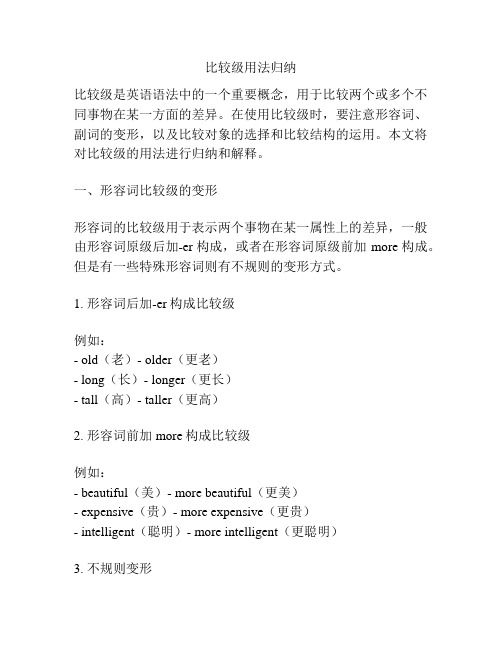
比较级用法归纳比较级是英语语法中的一个重要概念,用于比较两个或多个不同事物在某一方面的差异。
在使用比较级时,要注意形容词、副词的变形,以及比较对象的选择和比较结构的运用。
本文将对比较级的用法进行归纳和解释。
一、形容词比较级的变形形容词的比较级用于表示两个事物在某一属性上的差异,一般由形容词原级后加-er构成,或者在形容词原级前加more构成。
但是有一些特殊形容词则有不规则的变形方式。
1. 形容词后加-er构成比较级例如:- old(老)- older(更老)- long(长)- longer(更长)- tall(高)- taller(更高)2. 形容词前加more构成比较级例如:- beautiful(美)- more beautiful(更美)- expensive(贵)- more expensive(更贵)- intelligent(聪明)- more intelligent(更聪明)3. 不规则变形有一些形容词有一些不规则的变形方式,需要特别记忆,例如:- good(好)- better(更好)- bad(坏)- worse(更坏)- little(小)- less(更少)- many/much(多)- more(更多)二、副词比较级的变形副词的比较级变形方式和形容词类似,一般在副词后加-er,或者在副词前加more。
同样,也有一些特殊的副词比较级变形方式。
1. 副词后加-er构成比较级例如:- fast(快)- faster(更快)- soon(快)- sooner(更快)- late(晚)- later(更晚)2. 副词前加more构成比较级例如:- carefully(小心地)- more carefully(更小心地)- slowly(慢慢地)- more slowly(更慢慢地)- quietly(安静地)- more quietly(更安静地)3. 不规则变形有一些副词的比较级变形方式也是不规则的,例如:- well(好)- better(更好)- badly(糟糕地)- worse(更糟糕地)- little(少)- less(更少)- much(多)- more(更多)三、比较对象的选择在使用比较级时,需要选择适当的比较对象,即被比较的事物或者人。
小学英语比较级
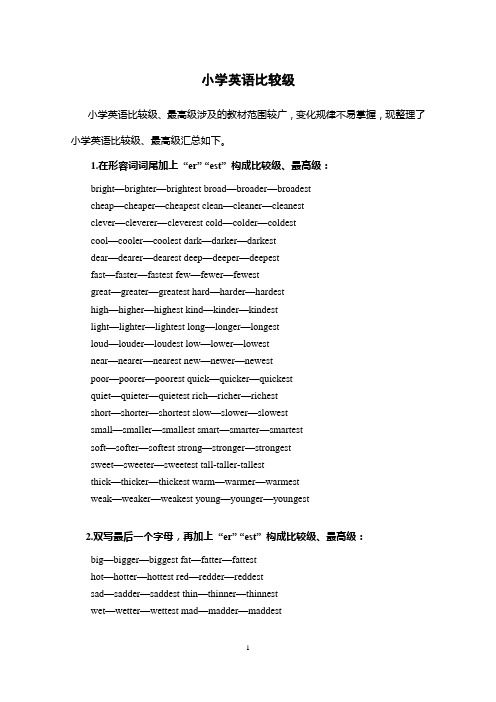
小学英语比较级小学英语比较级、最高级涉及的教材范围较广,变化规律不易掌握,现整理了小学英语比较级、最高级汇总如下。
1.在形容词词尾加上“er” “est” 构成比较级、最高级:bright—brighter—brightest broad—broader—broadestcheap—cheaper—cheapest clean—cleaner—cleanestclever—cleverer—cleverest cold—colder—coldestcool—cooler—coolest dark—darker—darkestdear—dearer—dearest deep—deeper—deepestfast—faster—fastest few—fewer—fewestgreat—greater—greatest hard—harder—hardesthigh—higher—highest kind—kinder—kindestlight—lighter—lightest long—longer—longestloud—louder—loudest low—lower—lowestnear—nearer—nearest new—newer—newestpoor—poorer—poorest quick—quicker—quickestquiet—quieter—quietest rich—richer—richestshort—shorter—shortest slow—slower—slowestsmall—smaller—smallest smart—smarter—smartestsoft—softer—softest strong—stronger—strongestsweet—sweeter—sweetest tall-taller-tallestthick—thicker—thickest warm—warmer—warmestweak—weaker—weakest young—younger—youngest2.双写最后一个字母,再加上“er” “est” 构成比较级、最高级:big—bigger—biggest fat—fatter—fattesthot—hotter—hottest red—redder—reddestsad—sadder—saddest thin—thinner—thinnestwet—wetter—wettest mad—madder—maddest3.以不发音的字母e结尾的形容词,加上“r” “st” 构成比较级、最高级:able—abler—ablest brave—braver—bravestclose—closer—closest fine—finer—finestlarge—larger—largest late—later—latestnice—nicer—nicest ripe—riper—ripestrude—ruder—rudest safe—safer—safeststrange—stranger—strangest wide—wider—widestwise—wiser—wisest white—whiter—whitest4.以字母y结尾的形容词,把y改为i,再加上“er” “est” 构成比较级、最高级:busy—busier—busiest dirty—dirtier—dirtiestdry—drier—driest early—earlier—earliesteasy—easier—easiest friendly—friendlier—friendliestfunny—funnier—funniest happy—happier—happiesthealthy—healthier—healthiest heavy—heavier—heaviesthungry—hungrier—hungriest lazy—lazier—laziestlucky—luckier—luckiest naughty—naughtier—naughtiestnoisy—noisier—noisiest pretty—prettier—prettiestsilly—sillier—silliest spicy—spicier—spiciestthirsty—thirstier—thirstiest ugly—uglier—ugliest5.双音节、多音节形容词,在单词前面加上“more” “most” 构成比较级、最高级:afraid—more afraid—most afraidbeautiful—more beautiful—most beautifulcareful—more careful—most carefulcheerful—more cheerful—most cheerfulcrowded—more crowded—most crowdeddangerous—more dangerous—most dangerousdelicious—more delicious—most delicious difficult—more difficult—most difficult exciting—more exciting—most exciting expensive—more expensive—most expensive famous—more famous—most famous frightened—more frightened—most frightened frightening—more frightening—most frightening hard-working—more hard-working—most hard-working helpful—more helpful—most helpful honest—more honest—most honest important—more important—most important interesting—more interesting—most interesting polite—more polite—most politeterrible—more terrible—most terribletired—more tired—most tired6.不规则变化的形容词:bad—worse—worstfar—farther—farthestgood—better—bestill—worse—worstlittle—less—leastmany—more—mostmuch—more—mostold—older—oldestwell—better—best。
小学六年级英语形容词的级知识点大全【二篇】
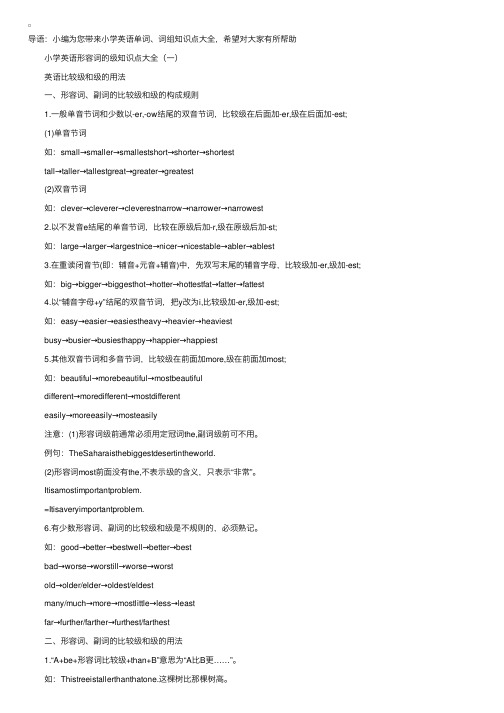
导语:⼩编为您带来⼩学英语单词、词组知识点⼤全,希望对⼤家有所帮助 ⼩学英语形容词的级知识点⼤全(⼀) 英语⽐较级和级的⽤法 ⼀、形容词、副词的⽐较级和级的构成规则 1.⼀般单⾳节词和少数以-er,-ow结尾的双⾳节词,⽐较级在后⾯加-er,级在后⾯加-est; (1)单⾳节词 如:small→smaller→smallestshort→shorter→shortest tall→taller→tallestgreat→greater→greatest (2)双⾳节词 如:clever→cleverer→cleverestnarrow→narrower→narrowest 2.以不发⾳e结尾的单⾳节词,⽐较在原级后加-r,级在原级后加-st; 如:large→larger→largestnice→nicer→nicestable→abler→ablest 3.在重读闭⾳节(即:辅⾳+元⾳+辅⾳)中,先双写末尾的辅⾳字母,⽐较级加-er,级加-est; 如:big→bigger→biggesthot→hotter→hottestfat→fatter→fattest 4.以“辅⾳字母+y”结尾的双⾳节词,把y改为i,⽐较级加-er,级加-est; 如:easy→easier→easiestheavy→heavier→heaviest busy→busier→busiesthappy→happier→happiest 5.其他双⾳节词和多⾳节词,⽐较级在前⾯加more,级在前⾯加most; 如:beautiful→morebeautiful→mostbeautiful different→moredifferent→mostdifferent easily→moreeasily→mosteasily 注意:(1)形容词级前通常必须⽤定冠词the,副词级前可不⽤。
例句:TheSaharaisthebiggestdesertintheworld. (2)形容词most前⾯没有the,不表⽰级的含义,只表⽰“⾮常”。
英语语法-形容词的比较级和最高级知识点汇总
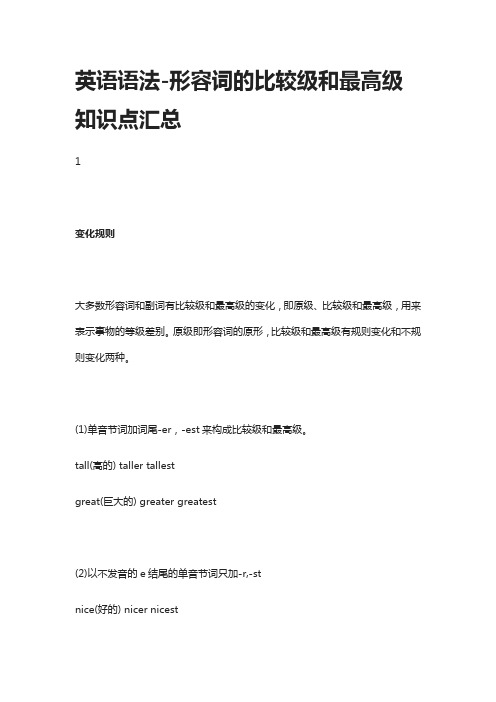
英语语法-形容词的比较级和最高级知识点汇总1变化规则大多数形容词和副词有比较级和最高级的变化,即原级、比较级和最高级,用来表示事物的等级差别。
原级即形容词的原形,比较级和最高级有规则变化和不规则变化两种。
(1)单音节词加词尾-er,-est来构成比较级和最高级。
tall(高的) taller tallestgreat(巨大的) greater greatest(2)以不发音的e结尾的单音节词只加-r,-stnice(好的) nicer nicestlarge(大的) larger largestable(有能力的) abler ablest(3)以一个辅音字母结尾的闭音节单音节词,双写结尾的辅音字母,再加-er,-est big(大的) bigger biggesthot热的) hotter hottestred红色的redder reddest(4)"以辅音字母+y"结尾的双音节词,改y为i,再加-er,-esteasy(容易的) easier easiestbusy(忙的) busier busiest(5)以ly结尾的副词,除early-earlier-earliest,其他都是加more most. Slowly-more slowly-most slowlyBravely-more bravely-most bravelyquickly-more quickly-most quickly(6)少数以-er,-ow结尾的双音节词未尾加-er,-estclever(聪明的) cleverer cleverestnarrow(窄的) narrower narrowest(7)其他双音节词和多音节词在前面加more,most来构成比较级和最高级。
如:important(重要的) more important most importanteasily(容易地) more easily most easily(8)一些词的比较级和最高级,可以加-er或-est,也可以加more或most 如:clever, polite等。
(完整版)小学英语形容词的比较级
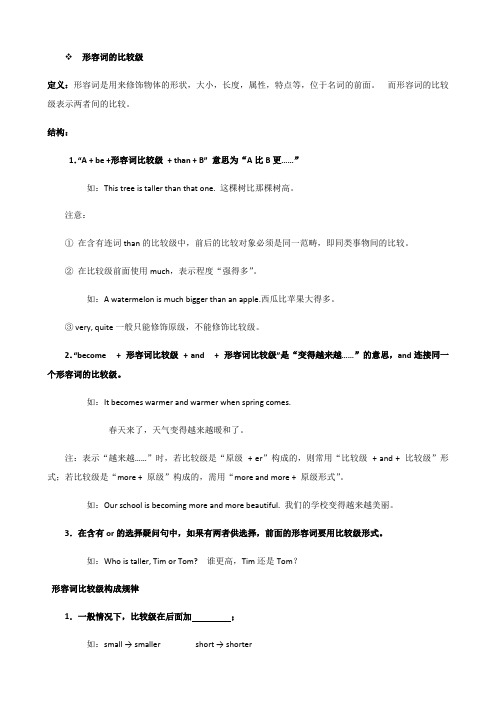
形容词的比较级定义:形容词是用来修饰物体的形状,大小,长度,属性,特点等,位于名词的前面。
而形容词的比较级表示两者间的比较。
结构:1.“A + be +形容词比较级+ than + B” 意思为“A比B更……”如:This tree is taller than that one. 这棵树比那棵树高。
注意:①在含有连词than的比较级中,前后的比较对象必须是同一范畴,即同类事物间的比较。
②在比较级前面使用much,表示程度“强得多”。
如:A watermelon is much bigger than an apple.西瓜比苹果大得多。
③ very, quite一般只能修饰原级,不能修饰比较级。
2.“become + 形容词比较级+ and + 形容词比较级”是“变得越来越……”的意思,and连接同一个形容词的比较级。
如:It becomes warmer and warmer when spring comes.春天来了,天气变得越来越暖和了。
注:表示“越来越……”时,若比较级是“原级+ er”构成的,则常用“比较级+ and + 比较级”形式;若比较级是“more + 原级”构成的,需用“more and more + 原级形式”。
如:Our school is becoming more and more beautiful. 我们的学校变得越来越美丽。
3.在含有or的选择疑问句中,如果有两者供选择,前面的形容词要用比较级形式。
如:Who is taller, Tim or Tom? 谁更高,Tim还是Tom?形容词比较级构成规律1.一般情况下,比较级在后面加;如:small → smaller short → shorter2.在重读闭音节(即:辅音+元音+辅音)中,先双写末尾的辅音字母,比较级加-er,如:big →bigger hot →hotter3.以不发音e结尾的单音节词,比较在原级后加;如:large →larger nice →nicer4.以“辅音字母+y”结尾的双音节词,,比较级加;如:easy →easier heavy →heavier5.多数多音节词,比较级在前面加;如:beautiful → more beautiful different → more different6.有少数形容词的比较级是不规则的,必须熟记。
形容词比较级常用词总结 - 形容词比较级常用词总结的特点
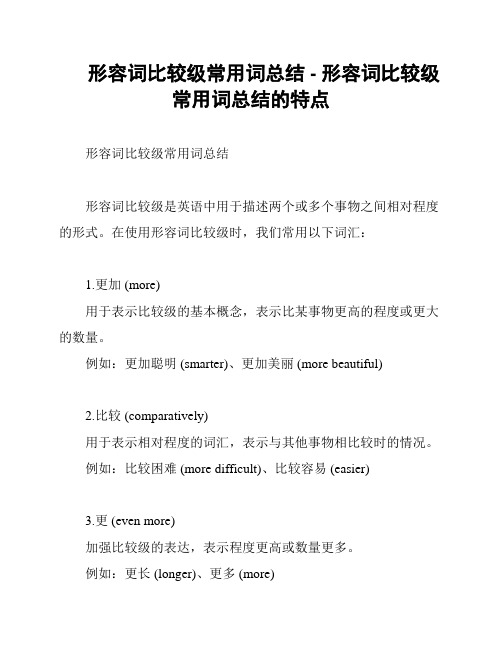
形容词比较级常用词总结 - 形容词比较级
常用词总结的特点
形容词比较级常用词总结
形容词比较级是英语中用于描述两个或多个事物之间相对程度的形式。
在使用形容词比较级时,我们常用以下词汇:
1.更加 (more)
用于表示比较级的基本概念,表示比某事物更高的程度或更大的数量。
例如:更加聪明 (smarter)、更加美丽 (more beautiful)
2.比较 (comparatively)
用于表示相对程度的词汇,表示与其他事物相比较时的情况。
例如:比较困难 (more difficult)、比较容易 (easier)
3.更 (even more)
加强比较级的表达,表示程度更高或数量更多。
例如:更长 (longer)、更多 (more)
4.较 (rather)
用于弱化比较级的表达,表示程度稍低或数量较少。
例如:较好 (better)、较少 (fewer)
5.更多 (more)
表示数量或程度更大。
例如:更多人 (more people)、更多知识 (more knowledge)
6.更少 (less)
表示数量或程度更小。
例如:更少时间 (less time)、更少金钱 (less money)
请注意,这仅是一些常用的形容词比较级词汇总结,实际使用时还应根据具体语境选择合适的词汇。
记住,形容词比较级是相对的,需要根据所比较的事物来决定使用哪种词汇。
希望这份简要总结对你有帮助!。
(完整版)小学英语比较级

一、形容词、副词的比较级和最高级的构成规则1.大多数单词的变法small→smaller→smallest short→shorter→shortest great→greater→greatest clever→clevere r→cleverest narrow→narrower→narrowest tall→taller→tallest2.以不发音e结尾的单音节词,比较在原级后加-r,最高级在原级后加-st;large→larger→largest nice→nicer→nicest3.先双写末尾的辅音字母,比较级加-er,最高级加-est;big→bigger→biggest hot→hotter→hottest fat→fatter→fattest thin-thinner-thinnest sad-sadder--sa ddest 4.以“辅音字母+y”结尾的双音节词,把y改为i,比较级加-er,最高级加-est;easy→easier→easiest heavy→heavier→heaviest busy→busier→busiesthappy→happier→happiest5.其他双音节词和多音节词,比较级在前面加more,最高级在前面加most;beautiful→more beautiful→most beautifuldifferent→more different→most different注意:(1)形容词最高级前通常必须用定冠词 the,副词最高级前可不用。
6.有少数形容词、副词的比较级和最高级是不规则的,必须熟记。
good-----better------best好的well------better------best身体好的bad------worse------worst坏的ill--------worse-------worst病的many--------more------most许多 much------more--------most许多few------less-------least少数几个little-------less------least少数一点far------further------furthest更进一步,程度far------farther------farthest更远,路程old-------older------oldest年老的(指年纪)old------elder-------eldest年老的(指兄弟姐妹的排行)二、形容词、副词的比较级和最高级的用法1.“A + be +形容词比较级 + than + B”意思为“A比B更……”。
(完整版)英语单词比较级
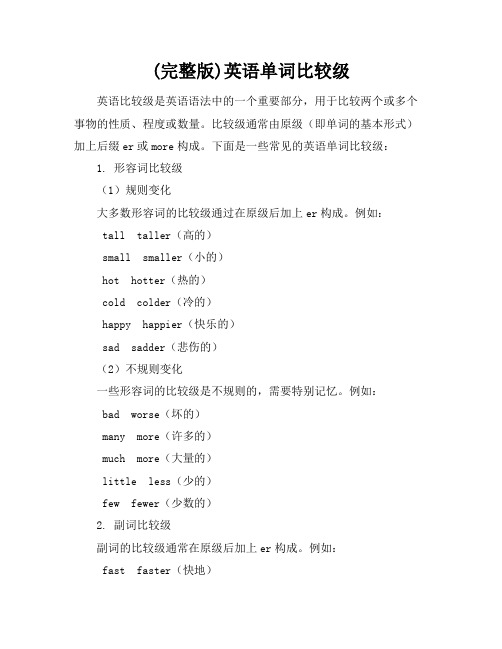
(完整版)英语单词比较级英语比较级是英语语法中的一个重要部分,用于比较两个或多个事物的性质、程度或数量。
比较级通常由原级(即单词的基本形式)加上后缀er或more构成。
下面是一些常见的英语单词比较级:1. 形容词比较级(1)规则变化大多数形容词的比较级通过在原级后加上er构成。
例如:tall taller(高的)small smaller(小的)hot hotter(热的)cold colder(冷的)happy happier(快乐的)sad sadder(悲伤的)(2)不规则变化一些形容词的比较级是不规则的,需要特别记忆。
例如:bad worse(坏的)many more(许多的)much more(大量的)little less(少的)few fewer(少数的)2. 副词比较级副词的比较级通常在原级后加上er构成。
例如:fast faster(快地)slowly more slowly(慢地)carefully more carefully(仔细地)well better(好地)badly worse(坏地)3. 比较级的用法(1)形容词和副词的比较级通常与than连用,构成比较句。
例如:He is taller than me.(他比我高。
)She runs faster than him.(她比他跑得快。
)(2)在比较级前可以使用一些修饰词,如a little, much, far 等,表示比较的程度。
例如:This book is a little more interesting than that one.(这本书比那本更有趣。
)She sings much better than her sister.(她唱歌比她姐姐唱得好多了。
)She is the tallest girl in our class.(她是我们班最高的女孩。
)He runs the fastest in our school.(他是我们学校跑得最快的。
比较级知识点归纳

比较级知识点归纳比较级是英语语法中一个重要的知识点,用于表示两个或多个事物在某个方面进行比较。
比较级的形式是在形容词或副词前加上-er,或在前面加上more,表示“更……”。
在本篇文章中,将详细讨论比较级的用法和使用场景。
一、形容词的比较级用法:1. 单音节形容词:单音节形容词通常直接加-er,例如:- My sister is taller than me.(我的妹妹比我高。
)- This book is cheaper than that one.(这本书比那本便宜。
)2. 双音节形容词:双音节形容词前加more,例如:- She is more beautiful than her sister.(她比她妹妹更漂亮。
)- This movie is more interesting than the previous one.(这部电影比之前的更有趣。
)3. 特殊形容词:有些形容词的比较级形式是不规则的:- good - better(好 - 更好)- bad - worse(坏 - 更糟)- far - farther(远 - 更远)二、副词的比较级用法:1. 单音节副词:单音节副词通常直接加-er,例如:- He runs faster than me.(他跑得比我快。
)- She sings louder than her friend.(她唱得比她朋友大声。
)2. 双音节副词和部分单音节副词:双音节副词和部分单音节副词前加more,例如:- He speaks more fluently than his classmates.(他说得比他的同学更流利。
)- She studies more diligently than before.(她比以前更用功学习。
)三、比较级的用法:1. 比较两者之间的差异:- The weather today is hotter than yesterday.(今天的天气比昨天热。
英语常见形容词及比较级最高级变化一览表

形容词第一章比较级、最高级变化一览表规则变化1.单音节以及少数双音节的词尾加上“er”“est”构成比较级、最高级:bright明亮的—brighter—brightest broad广阔的—broader—broadestcheap便宜的—cheaper—cheapest clean干净的—cleaner—cleanest clever聪明的—cleverer—cleverest cold寒冷的—colder—coldestcool凉的—cooler—coolest dark黑暗的—darker—darkestdear贵的—dearer—dearest deep深的—deeper—deepestfast迅速的—faster—fastest few少的—fewer—fewestgreat伟大的—greater—greatest hard困难的,硬的—harder—hardesthigh高的—higher—highest kind善良的—kinder—kindestlight轻的—lighter—lightest long长的—longer—longestloud响亮的—louder—loudest low低的—lower—lowestnear近的—nearer—nearest new新的—newer—newestpoor穷的—poorer—poorest quick快的—quicker—quickestquiet安静的—quieter—quietest rich富裕的—richer—richestshort短的—shorter—shortest slow慢的—slower—slowestsmall小的—smaller—smallest smart聪明的—smarter—smartestsoft柔软的—softer—softest strong强壮的—stronger—strongest sweet甜的—sweeter—sweetest tall高的-taller - tallest thick厚的—thicker—thickest warm温暖的—warmer—warmestweak弱的—weaker—weakest young年轻的—younger—youngest2以一个元音加一个辅音字母结尾的单音节词即重读闭音节词,双写结尾的辅音字母er,-estbig大的—bigger—biggest fat胖的—fatter—fattesthot热的—hotter—hottest red红的—redder—reddestsad伤心的—sadder—saddest thin瘦的—thinner—thinnestwet湿的—wetter—wettest mad疯的—madder—maddest特别提醒:new, few, slow, clean等词含有字母组合,且发的是长元音,不用双写;3.以不发音的字母e结尾的形容词,加上“r”“st”构成比较级、最高级:able能干的—abler—ablest brave勇敢的—braver—bravestclose接近的—closer—closest fine好的,完美的—finer—finestlarge巨大的—larger—largest late迟的—later—latest nice好的—nicer—nicest ripe成熟的—riper—ripestrude粗鲁的—ruder—rudest safe安全的—safer—safest strange奇怪的—stranger—strangest wide宽广的—wider—widestwise睿智的,聪明的—wiser—wisest white白的—whiter—whitest4.“以辅音字母+y”结尾的词改y为i,再加-er, -estbusy忙碌的—busier—busiest dirty脏的—dirtier—dirtiest dry干燥的—drier—driest early早的—earlier—earliesteasy容易的—easier—easiest friendly友好的—friendlier—friendliest funny好玩的—funnier—funniest happy开心的—happier—happiest healthy健康的—healthier—healthiest heavy重的—heavier—heaviest hungry饿的—hungrier—hungriest lazy懒惰的—lazier—laziestlucky幸运的—luckier—luckiest naughty调皮的—naughtier—naughtiest noisy嘈杂的—noisier—noisiest pretty美丽的—prettier—prettiestsilly傻的—sillier—silliest spicy辣的—spicier—spiciest thirsty渴的—thirstier—thirstiest ugly丑的—uglier—ugliest5.双音节、多音节形容词即音标中含有三个或三个以上元音音素的词,在单词前面加上“more”“most”构成比较级、最高级:afraid害怕的—more afraid—most afraidbeautiful美丽的—more beautiful—most beautifulcareful仔细的—more careful—most carefulcheerful开心的—more cheerful—most cheerfulcrowded拥挤的—more crowded—most crowdeddangerous危险的—more dangerous—most dangerousdelicious美味的—more delicious—most deliciousdifficult困难的—more difficult—most difficultexciting令人兴奋的—more exciting—most excitingexpensive昂贵的—more expensive—most expensivefamous着名的—more famous—most famousfrightened受惊的—more frightened—most frightenedfrightening令人害怕的—more frightening—most frighteninghard-working勤奋的—more hard-working—most hard-workinghelpful有帮助的—more helpful—most helpfulhonest诚实的—more honest—most honestimportant重要的—more important—most importantinteresting有趣的—more interesting—most interestingpolite有礼貌的—more polite—most politeterrible可怕的—more terrible—most terribletired累的—more tired—most tired特别提醒:以形容前缀un构成的三音节形容词不适合上述情况,如:unhappy-unhappier-unhappiest, untidy-untidier-untidiest6. 以形容词+ly构成的副词要在前面加 more,mostSlowly-more slowly-most slowly quickly-more quickly-most quickly特别提醒:early -earlier-earliest7. 由ing分词和-ed分词演变过来的形容词包括不规则动词如know→known只能加more或most来表示它们的比较级和最高级;interesting- more interesting -most interestingexcited- more excited- most excitingtired- more tired - mosttiredboring-more boring-most boring不规则变化bad坏的—worse—worstfar远的—farther—farthest far—further—furthestgood好的—better—bestill病的—worse—worstlittle少的—less—leastmany多的—more—mostmuch多的—more—mostold年老的—older—oldest old—elder—eldestwell好的,身体好的—better—best特别提醒:◇further不仅可以指“距离更远”,还可指“程度更深”;记住以下三个词组:further study 进修further education继续教育further information 进一步的信息◇elder仅用于同辈之间的排行,如: elder sister姐姐 elder brother 哥哥◇less作为“更少”仅用来修饰不可数名词,修饰可数名词表示“更少”要用fewer;第二章形容词副词比较级较难考点◇少数单音节词前面加 more, most 构成比较级和最高级,这类形容词一般为表语形容词和由过去分词变成的形容词afraid -more afraid, most afraid tired - more tired , most tiredfond - more fond , most fond glad -more glad , most gladbored - more bored , most bored pleased---- more pleased , most pleased ◇下列形容词和副词的比较级和最高级有两种形式,即:既可加-er/-est也可加more/most strict, often, friendly, clever◇下列形容词和副词没有比较级和最高即表示“最高程度”或“绝对状态”的形容词和副词没有比较级和最高级如:empty, wrong, perfect, unique, extreme, excellent, favourite, true, right, correct, extremely ...◇比较应在同类事物之间进行;误:Your English is better than me.正:Your English is better than mine.◇比较级前可以有一个表示程度的状语,最常见的三大修饰词是:a little, much, even; 以下单词也可用来修饰:any, far, still, a lot, yet, rather;My sister is a little taller than me.Their house is much larger than ours.另外,名词短语也可修饰比较级,说明程度;I’m three years older than he.特别提醒:very, quite, too不可修饰比较级;◇避免重复使用比较级;误:He is more kinder to small animals than I.正:He is much kinder to small animals than I.误:He is more cleverer than his brother.正:He is cleverer than his brother.◇比较要符合逻辑,在同一范围内比较时,避免将主语含在比较对象中,这时需使用other来排除自身;误:China is larger that any country in Asia.正:China is larger than any other country in Asia.误:John studies harder than any student in his class.正:John studies harder than any other student in his class.正:John studies harder than any of the other students in his class.正:John studies harder than anyone else in his class.◇比较要遵循前后一致的原则,注意前后呼应;The population of Shanghai is larger than that of Beijing.It is easier to make a plan than to carry it out.◇序数词通常只修饰最高级;Africa is the second largest continent.The Yellow River is the second longest river in China.This is the third most popular song of Michael Jackson.◇为避免重复,我们通常用that, those, one, ones代替前面出现的名词;that代替可数名词单数和不可数名词,those代替可数名词复数;one既可指人又可指物,只能代替可数名词; The weather in China is different from that in America.The book on the table is more interesting than that或the oneon the desk.A box made of steel is stronger than one made of wood.误:In winter, the weather of Beijing is colder than it of Shanghai.正:In winter, the weather of Beijing is colder than that of Shanghai.◇“否定词 + 比较级”相当于最高级;----Wait until we get a satisfactory reply, will you----I couldn't agree more. The idea sounds great to me.Nothing is so easy as this. =Nothing is easier than this. =This is the easiest thing. ◇比较级前一般不加冠词;但表示两者中较突出者,且比较级后又有名词或出现了of the two,这时比较级前一定要加the;He is the taller of the two.Of the two jobs,he chose the harder.Which is the younger one, Lily or Lucy试比较:Which is larger, Canada or AustraliaWhich is the larger country, Canada or AustraliaShe is taller than her two sisters.She is the taller of the two sisters.◇不含than 的比较级前可加不定冠词修饰,构成“a/an+比较级+单数可数名词”表示“一个更……的人/物”;Why don’t you use a sharper knife 你为什么不用一把更锋利的刀呢◇比较级than 后应用人称代词的主格,但非正式语体中常用宾格;He is taller than I/me.◇为避免重复,比较级中同样的动词用助动词do, does, did替代;I spend less time doing homework than John does.She tells more funny jokes than we do.以下内容不是初中教学的重点,仅供拓展之用;◇形容词most前面没有the,不表示最高级的含义,只表示“非常”;It is a most important problem.=It is a very important problem.◇倍数表达法▲A is threefour, etc.times the sizeheight, length etc.of B.The new building is four times the sizethe heightof the old one.这座新楼是那座旧楼的四倍大高/这座新楼比那座旧楼大高三倍;▲A is threefour, etc.times as bighigh, long, etc.as B.Asia is four times as large as Europe. 亚洲是欧洲的四倍大/亚洲比欧洲大三倍;▲A is three four, etc.times biggerhigher, longer, etc.than B.Your school is three times bigger than ours.你们的学校比我们的学校大三倍;用times 表倍数通常用于三倍以上,两倍可以用twice或double.第三章形容词副词比较级最高级重点句型归纳◇句型一:形容词或副词比较级+than…□注意事项:该句型为比较级的最基本句型;只要看到than,即可确定前面使用比较级;He is taller than I am.The boy does his homework more carefully than the girl.◇句型二:less + 形容词的原级 + than□注意事项:该句型表示“不如、不及”,特别需要注意的是,less本身就是little的比较级,后面必须跟形容词的原级,否定就造成了比较级的重复使用;This computer is less expensive than that one.◇句型三:as +形容词或副词的原级+ as□注意事项:该句型表示对比的两者程度相当,as之间必须跟形容词或副词的原级,决不能使用比较级;此外,还要确定使用形容词还是副词;确定的依据就是根据第一个as前的动词,如果是系动词如be,感官动词look, sound, smell, taste, feel等,那么就用形容词的原级,如果前面的动词是一般的实义动词,那么就必须用副词的原级修饰动词;This lesson is as easy as that one.Lucy talks with old people as politely as her sister.特别提醒:as…as之间也可以跟名词,句型如下:☆as +形容词+ a/an +单数名词+asHe is as kind a person as his father. 他和他爸爸一样都是善良的人;☆as + many/much+不可数名词/可数名词复数+asI can carry as much paper as you can. 你能搬多少纸,我也能;I have as many books as you do. 我的书和你的一样多;We’ll give you as much help as we can. 我们将尽我们所能给你帮助;其它几个关于as…as的句型:☆as … as one can:尽其所能He began to run as fast as he could.☆as … as possible:尽可能Please helpusas quickly as possible.☆as soon as…一……就……He will call me as soon as he comes here.◇句型四:not as/so +形容词或副词的原级+ as□注意事项:该句型表示“前者不如后者……”,往往可以与句型一和句型二替换;第一个as可以换为so; This classroom is not as bright as yours.I cannot run as fast as you.◇句型五:the +形容词或副词最高级+ in / of / among +比较范围□注意事项:如果这里为副词最高级,前面的the常常省略;介词in和of的用法完全不一样;in表示“在某一范围内”,如:in the classroom,in the world;of表示“在同类之间”,of后面的词与主语同类,另名词前一般有冠词the;among表示“在三者或三者以上之间”,among后接代词或没有修饰语的名词;The Changjiang River is the longest river in our country.Peter is the tallest of the six students.This picture is the most beautiful among these.◇句型六:one of + 形容词最高级+可数名词复数形式□注意事项:one of有三大考点:1. 后跟形容词最高级;2. 后接可数名词复数形式;3. 作主语时主语为one,谓语动词用单数形式;One of the smallest dinosaurs was about one metre long.◇句型七:比较级+and +比较级 / more and more +多音节词的原级□注意事项:该句型表示“越来越……”,如果该形容词比较级构成形式加er,则用前面的句型;如果该形容词比较级加more构成,则用后面的句型;It is getting hotter and hotter.The girl is becoming more and more beautiful.◇句型八:the +比较级+…, the +比较级+…□注意事项:该句型意思为“越……就越……”,表示两种情况同时变化;The more you eat, the fatter you will be.In the test, the more careful you are, the fewer mistakes you will make.◇句型九:be different from□注意事项:该句型没有运用比较级,但也是对两者事物进行比较;注意前后比较需在同类事物中进行; My schoolbag is different from yours.◇句型十:the same as… / the same…as…□注意事项:该句型同样没有运用比较级,表示两者之间具有共同特性;注意这里的as和same为固定搭配,不能随便变换;I don’t want to buy the same things as Amy did.◇句型十一:比较级+than + any other +名词单数形式□注意事项:any other 后面跟单数名词,表示“任何别的”,即主语在范围内,必须把自身从这一范围内除去,否则逻辑上不通;如果主语不在这一范围内,那么要把other去掉,只用any即可; Shanghai is larger than any other city in China.上海在中国这个范围内,所以用any otherShanghai is larger than any city in Jiangsu. 上海不在江苏,所以只需用any◇句型十二:比较级+than + the other +名词复数形式□注意事项:该句型相当于any other +名词单数形式,常用来进行同义句改写;该句型与句型十一虽然波表面上都是比较级,但实际上相当于最高级;以下三句表达的是同一个意思;Daniel is the most hard-working student in our class.Daniel is more hard-working than any other student in our class.Daniel is more hard-working than the other students in our class.特别提醒:表示两者人或物比较时,比较的对象应是同类事物,不同类的事物之间无法进行比较;。
英语形容词单词比较级变化大全

英语形容词单词比较级变化大全总汇英语比较级总汇大:big-bigger-biggest 小:small-smaller-smallest大:large-larger-largest聪明:smart-smarter- smartest明亮:bright-brighter-brightest 昏暗:dark-darker-darkest快:fast-faster-fastest 慢: slow-slower-slowest热:hot-hotter-hottest 冷: cold-colder-coldest容易:easy-easier-easiest 难: hard-harder-hardest重:heavy-heavier-heaviest 轻:light-lighter-lightest快乐:happy-happier-happiest 远:far-farther-farthest早:early-earlier-earliest 迟:late-later-latest干净:clean-cleaner-cleanest 脏:dirty-dirtier-dirtist干燥:dry-drier-driest 潮湿:wet-wetter-wettest新的:nice-nicer-nicest 宽:wide-wider-widest好:good-better-best 好:well-better-best坏:bad-worse-worst 新:new-newer-newest许多:many/much-more-most 少:little-less-least老:old-older-oldest 年轻:yong-yonger-yongest短:short-shorter-shortest 长:long-longer-longest低:low-lower-lowest 高:tall-taller-tallest瘦:thin-thinner- thinnest 胖:fat-fatter-fattest高(身高):High-higher-highest 忙:busy-busier-busiest虚弱:weak-weaker-weakest 强壮:strong-stronger-strongest友好:friendly---more friendly---the most friendly有趣:interesting---more interesting-- -the most interesting小心:carefully---more carefully- --the most carefully重要:important-- more important--- the most important 漂亮:beautiful- -more beautiful-- the most beautiful。
小学四年级英语下册《形容词比较级的用法》归纳

It s still colder today.
今天更冷一些。
-Have you any more? -Oh, sorry, no more.
-你还有吗?-哦,对不起,没有了。
伦敦的建筑比这儿的难看得多。
This story is even more interesting than that one.
这个故事比那个更有趣。
I made a lot more mistakes than you (did)。
我犯的错误比你多多了。
Your cake is a little larger than mine.
太阳和月亮,哪一个更大?
三、比较级+and+比较级
I
天越来越黑了。
He is getting more and more interested in sports.
他对体育越来越感兴趣。
四、The more…, the more…
The more you eat, the more you want.
一、在"…than…"句中
He is taller than I.(口语中常作:He is taller than me.)
他比我高。
He is two heads taller than I.
他比我高出两个头。
二、在"which…, …or…?"句中,表示两者比较
Which is bigger, the sun or the moon?
你越吃越想要。
五、形容词比较级前可受 much, far, a lot, still, no, a little,even, any 修饰,表示超出的程度
英语中的形容词有哪些比较级和最高级

英语中的形容词有哪些比较级和最高级?英语中的形容词比较级和最高级通常是通过在形容词前加上不同的前缀来构成的。
以下是常见的形容词比较级和最高级形式:1. 一般形式:形容词的原级(Positive Degree)是形容词的基本形式,用于描述事物的基本特征。
例如:big(大)、beautiful(美丽)、fast(快)等。
2. 比较级(Comparative Degree):用于比较两个事物的性质、大小、品质等。
形成比较级的一般规则是在形容词前加上"-er"或者在形容词前加上"more"。
例如:- big(大)- bigger(更大)- beautiful(美丽)- more beautiful(更美丽)- fast(快)- faster(更快)3. 最高级(Superlative Degree):用于比较三个或更多事物之间的性质、大小、品质等,表示最高程度。
形成最高级的一般规则是在形容词前加上"-est"或者在形容词前加上"most"。
例如:- big(大)- biggest(最大)- beautiful(美丽)- most beautiful(最美丽)- fast(快)- fastest(最快)需要注意的是,有些形容词的比较级和最高级形式是不规则的,需要记住其特殊形式。
例如:- good(好)- better(更好)- best(最好)- bad(坏)- worse(更坏)- worst(最坏)- much(多)- more(更多)- most(最多)以上是英语中常见的形容词比较级和最高级形式。
掌握这些形式可以帮助我们在表达时更准确地描述事物的特征和进行比较。
- 1、下载文档前请自行甄别文档内容的完整性,平台不提供额外的编辑、内容补充、找答案等附加服务。
- 2、"仅部分预览"的文档,不可在线预览部分如存在完整性等问题,可反馈申请退款(可完整预览的文档不适用该条件!)。
- 3、如文档侵犯您的权益,请联系客服反馈,我们会尽快为您处理(人工客服工作时间:9:00-18:30)。
英语形容词比较级
(一)一般句式的构成:
A + is / are+ 形容词比较级+ than + B
A 是主格
B 是宾格
如:She is taller than me.
主格+ be + 形容词比较级+ than + 宾格
(二)英语形容词比较级的构成
英语形容词比较等级有三个:
原级,比较级和最高级。
形容词比较等级形式变化有规则的和不规则的两种。
规则变化:
1)单音节词末尾加-er(比较级),-est(最高级)【例】原级比较级最高级
great greater greatest
small smaller smallest
clean cleaner cleanest
2)单音节如以e结尾,只加-r(比较级),-st(最高级)【例】fine finer finest
nice nicer nicest
wide wider widest
3)闭音节单音节词如末尾只有一个辅音字母,须先双写这个辅音字母,再加-er (比较级),-est(最高级)
【例】big bigger biggest
hot hotter hottest
red redder reddest
4)少数以-y,-er,ow,-ble结尾的双音节词,末尾加-er(比较级),-est(最高级)。
以-y结尾的词,如-y前是辅音字母,则变y为-i,再加-er和-est。
以-e结尾的词只加-r和-st。
【例】clever cleverer cleverest
narrow narrower narrowest
able abler ablest
easy easier easiest
5)其它双音节和多音节词皆在前面加单词more和most。
【例】careful more careful most careful
difficult more difficult most difficult
delicious more delicious most delicious
不规则变化:
原级比较级最高级
good/well better best
bad worse worst
many/much more most
little less least
far farther/further farthest/furthest
注:有些形容词一般没有比较等级。
如:right, wrong, woolen等。
形容词的比较等级的用法:
比较级用于二者的比较。
【例】Li Ping is older than Wang Hai.
李平比王海年纪大。
There are more students in Class One than in Class Two.一班比二班学生多。
形容词是修饰名词、表示名词属性的词。
学习形容词,很重要的一部分内容就是形容词的比较级、最高级。
关于它们的构成,之前已经有所归纳,请看形容词比较级的构成方法。
今天就来说说比较级和最高级吧——
形容词比较级的用法
一、在"…than…"句中:
He is taller than I.
(口语中常作:He is taller than me.)
他比我高。
He is two heads taller than I.
他比我高出两个头。
二、在"which…,…or…?"句中,
表示两者比较:
Which is bigger, the sun or the moon?
太阳和月亮,哪一个更大?
三、比较级+and+比较级:
It's getting darker and darker.
天越来越黑了。
He is getting more and more interested in sports.
他对体育越来越感兴趣。
四、The more…,the more…:
The more you eat, the more you want.
你越吃越想要。
五、形容词比较级前可受much, far, a lot, still, no, a little, even, any 修饰,表示超出的程度:
We have a much better life now.
我们现在的日子好得多了。
The buildings look far uglier in London than here.
伦敦的建筑比这儿的难看得多。
This story is even more interesting than that one.
这个故事比那个更有趣。
I made a lot more mistakes than you (did)。
我犯的错误比你多多了。
Your cake is a little larger than mine. 你的蛋糕比我的大一点儿。
It's still colder today.
今天更冷一些。
-Have you any more?
-Oh, sorry, no more.
-你还有吗?-哦,对不起,没有了。
She's no better yet.。
